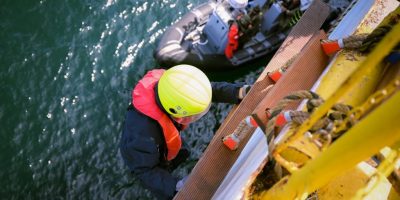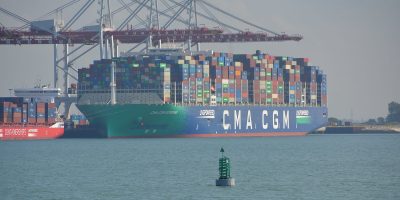
In the anniversary edition of our magazine, we gave companies in the maritime and logistics sector a chance to put themselves in the spotlight. In this contribution, we meet the Directorate-General (DG) of Shipping, part of FPS Mobility and Transport.
“We represent an important economic sector. We seek a sustainable balance between economic, social and environmental interests,” Claeyssens said. To achieve that goal, DG Shipping focuses on three things: the development, implementation and compliance with (international) policy. “We transpose policy into legislation and provide a legal framework, but also carry out inspections to monitor a level playing field.”
Today, 160 people work for DG Shipping. The powers are therefore broad. “As a flag state, we are responsible for ships flying the Belgian flag. As a coastal state, we monitor the North Sea together with partners such as customs, police and the navy in the MIK (Maritime Information Crossroads). Last but not least, we are also a port state. In our ports, our Port State control inspectors inspect whether foreign ships comply with international regulations and, if necessary, we detain ships.”
Underwater infrastructure
A focus point of DG Shipping is the security of underwater infrastructure. “Above water we secure wind turbines and transformers, among other things, but there is also crucial infrastructure under water. Their security is included in the new security law.”
“Underwater there are not only pipelines for gas, and perhaps soon for hydrogen or CO2, but also electricity cables connecting countries (such as the NEMO link) and data cables connecting the whole of Europe. Infrastructure lying on the seabed is very critical for Europe. Just think what happened to the Nord Stream pipeline,” says Claeyssens. If a cable is cut, a large chunk of Europe could be in trouble.
The risk is getting more attention now, but DG Shipping has been dealing with it for a long time. “Of course, we keep an eye on suspicious ships that come floating off our coast; if they sail outside our territorial waters, there is little we can do. We also keep a close eye on whether there is nothing on the seabed that should not be there, often together with the operator. Not just a visual check, because new technology makes cables pressure-sensitive, for example, which automatically detects suspicious objects on the infrastructure.”
“Since that infrastructure operates across borders in many cases, close cooperation with North Sea countries is very important. Belgium is taking the lead in this and also made the necessary resources available to exchange information digitally.”
Ports
As a port state, port security is also a competence of DG Shipping, with the fight against drugs a priority. “Here, too, there are three hatches: prevention, increasing the chance of being caught and improving punishment,” Claeyssens said. “Here I want to emphasise that the private companies in the port are also making every effort to contain this and that there is efficient cooperation with all partners in the port.”
The safety of Belgian ships in international waters is also a concern of DG Shipping. “There are a lot of critical ships, such as gas and oil tankers, flying the Belgian flag that enter areas where the risk of piracy or armed robbery is real. In consultation with shipowners, we can close off areas to Belgian ships, such as the Black Sea, or impose additional security measures. In those areas, ships are monitored 24/7.”
“So we are active on many fronts to combat crime. In an ever-changing context, we remain vigilant,” Claeyssens concludes.




